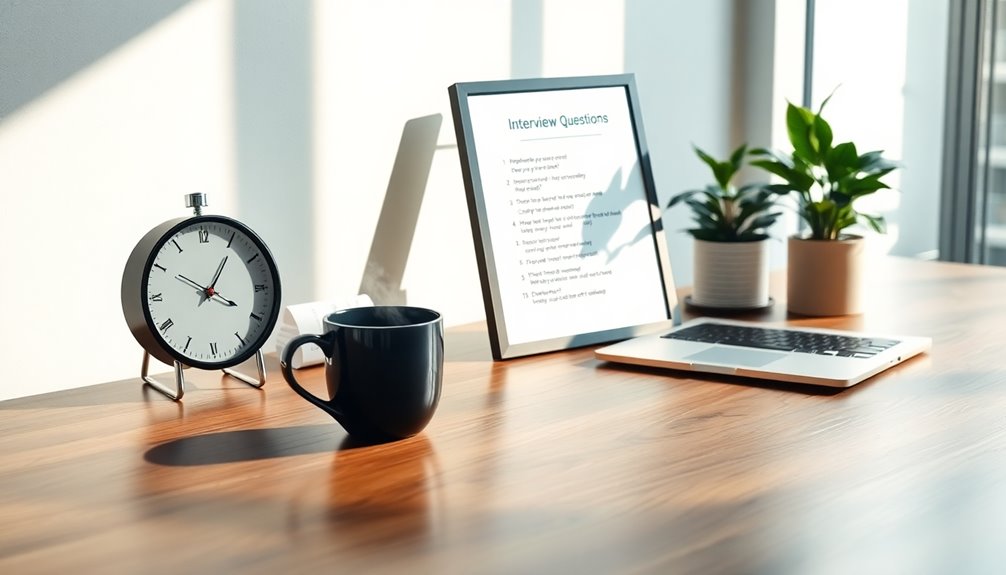Revealing the secrets of technical interviews starts with thorough preparation. You need to anticipate job-specific questions and practice your responses for clarity. Employers look for authenticity over exaggerated expertise, so be honest about any knowledge gaps. Expect to explain complex concepts, share real-life problem-solving examples, and discuss your approach to learning new technologies. Clear articulation of industry terms is essential too. After your interview, make sure to follow up with a thank-you note and stay engaged in your job search. There's a lot more to uncover that can help you ace your next technical interview.
Key Takeaways
- Research job-specific technical questions to anticipate what may be asked during the interview.
- Practice articulating complex concepts in simple terms to demonstrate clarity of thought.
- Showcase real-life examples of problem-solving to highlight your practical experience.
- Be transparent about knowledge gaps and emphasize your willingness to learn and improve.
- Follow up after the interview with a thank-you email and maintain networking efforts.
Understanding Technical Interviews

Technical interviews are essential in evaluating your technical skills for specialized roles across various sectors.
These interviews focus on appraising your knowledge and problem-solving abilities, helping employers determine if you're a good fit for the position. You'll find technical interviews commonly used in IT, engineering, healthcare, and even marketing or education roles.
Expect to face questions that relate specifically to the job you're applying for, often exploring your understanding of industry-specific terms and your past experiences.
It's vital to demonstrate your technical proficiency while also showcasing your passion for the field. Remember, honesty about any knowledge gaps is better than overstating your expertise, as employers value authenticity and a genuine interest in the role.
Preparing for Success

To set yourself up for success in a technical interview, thorough preparation is key. Start by reviewing any instructions or expectations provided by the employer.
Research job-specific technical questions to anticipate what you might face. Practice your responses to common technical queries, ensuring you can articulate your thoughts clearly and confidently.
Identify any unfamiliar topics and dedicate time to learn them. Additionally, consider completing online assessments to evaluate and strengthen your technical skills.
This preparation not only boosts your confidence but also enhances your chances of securing a second interview or job offer. Remember, the more prepared you are, the more you'll impress your interviewers with your knowledge and problem-solving abilities.
Key Employer Expectations

Understanding what employers expect during a technical interview can set you apart from other candidates. They look for candidates who can clearly articulate industry-specific terms and provide concrete examples of their technical skills and past experiences.
It's vital to be honest about any knowledge gaps; they value transparency over embellishment. Showcasing your passion for the role and the technical aspects of the job is significant.
Employers also appreciate candidates who can discuss how they maintain their technical knowledge and continuously improve their skills. Be prepared to share real-life examples of your problem-solving approaches and any self-taught skills.
Meeting these expectations not only demonstrates your qualifications but also your commitment to the field.
Common Technical Questions

During a technical interview, you can expect a variety of common questions that assess your expertise and problem-solving abilities.
These questions often dive deep into your technical knowledge and real-world experience. Here are some typical topics you might encounter:
- Explain a complex technical concept in simple terms.
- Share an example of a technical challenge you solved.
- Describe your approach to learning new technologies.
- Discuss areas where you feel you need improvement.
- Identify industry-specific terms relevant to the role.
Being prepared to answer these questions honestly and clearly can showcase your skills and passion for the position.
Effective Post-Interview Strategies

After addressing common technical questions, it's important to focus on what happens next.
Start by obtaining your interviewer's contact details and ask about their feedback timeline. Within one business day, send a thank-you email that highlights key discussion points and shows appreciation for their time. This reinforces your interest in the position and keeps you fresh in their mind.
Document any additional questions that arose during the interview for future reference.
Consider following up if you haven't heard back by the expected date, but keep it brief and professional.
Ultimately, continue your job search by applying to other opportunities and networking. Stay proactive, and remember that every interview is a chance to refine your skills and expand your professional connections.
Reflecting on Performance

While reflecting on your performance can feel challenging, it's essential for your growth as a candidate. This self-assessment helps you identify strengths and areas needing improvement, enhancing your interview skills for future opportunities.
Consider these key points when reflecting:
- Note specific questions that stumped you.
- Analyze your communication style and clarity.
- Identify technical concepts you want to master.
- Seek feedback from peers or mentors on your approach.
- Review your preparation process and adjust as needed. Additionally, focusing on your communication skills can significantly improve your clarity in conveying technical information during interviews.
Continuing Your Job Search

Reflecting on your interview performance opens the door to enhancing your job search strategy. Use this insight to identify your strengths and areas that need improvement.
Once you've done that, create a list of relevant technical terms and topics to research further. Consider enrolling in online courses or workshops to bolster your skills. To stand out, incorporate data-driven marketing strategies into your personal branding efforts as you search for roles.
Keep applying for roles that interest you, maintaining a steady momentum in your search. Networking plays an essential role, so reach out to industry professionals and attend events to build connections.
Prepare for additional interviews by practicing your responses and refining your approach. Stay positive and persistent; each step you take brings you closer to landing that job offer you desire.
Frequently Asked Questions
What Types of Technical Assessments Might I Encounter During Interviews?
During interviews, you might encounter various technical assessments, including coding challenges, system design tasks, or case studies relevant to the role.
Employers often use online platforms for coding tests to evaluate your problem-solving skills in real-time. You may also face scenario-based questions that assess your approach to real-world problems.
Be prepared to explain your thought process and demonstrate your technical knowledge, as clarity and communication are essential during these assessments.
How Can I Showcase Soft Skills During a Technical Interview?
To showcase your soft skills during a technical interview, demonstrate your communication, teamwork, and problem-solving abilities.
Share examples where you collaborated effectively, resolved conflicts, or adapted to challenges.
Listen actively to the interviewer, ask thoughtful questions, and express enthusiasm for the role.
Are There Specific Dress Codes for Technical Interviews?
When it comes to dress codes for technical interviews, it often depends on the company culture.
Generally, you can't go wrong with business casual attire—think slacks and a nice shirt. If you know the company leans more formal, opt for a suit.
Conversely, if it's a startup with a relaxed vibe, smart casual may be acceptable.
Always err on the side of being slightly overdressed rather than underdressed to make a great first impression.
How Long Do Technical Interviews Typically Last?
Technical interviews typically last anywhere from 30 minutes to two hours, depending on the employer and the complexity of the role.
You'll often encounter a mix of technical questions, problem-solving tasks, and behavioral inquiries during this time.
It's essential to manage your time effectively, so stay focused and articulate your thoughts clearly.
What Should I Do if I Don't Know the Answer to a Question?
If you don't know the answer to a question, it's okay to admit it.
Instead of panicking, take a moment to think aloud about related concepts or your thought process. This shows your problem-solving skills.
You can also ask clarifying questions or express your willingness to learn. Employers value honesty and your approach to challenges, so stay calm and demonstrate your analytical thinking, even if you don't have the exact answer.
Conclusion
You've navigated the maze of technical interviews, and now you might think it's over. Ironically, this is just the beginning. Each interview is a stepping stone, not an endpoint. Embrace the challenges, because every question you faced—and even stumbled on—has shaped you into a more resilient candidate. So, while you may feel relieved, remember that the real journey lies ahead. Keep refining your skills and searching for opportunities. After all, success isn't just about landing the job; it's about growth.









